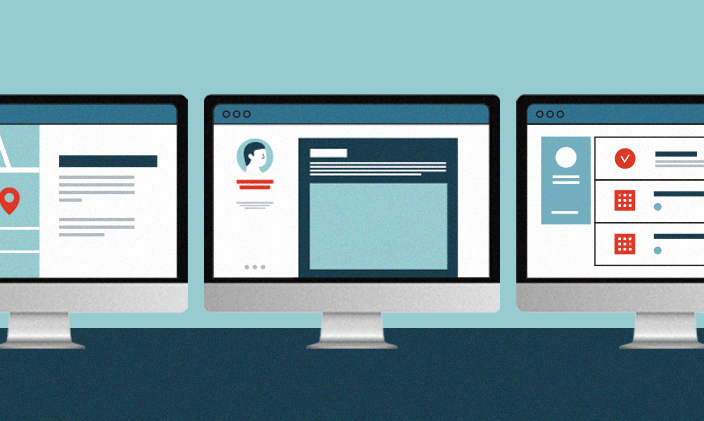Articles > Information Technology > Software developer vs. engineer vs. programmer
Software developer vs. engineer vs. programmer
This article was updated on January 24, 2024.

Written by Michael Feder

Reviewed by Kathryn Uhles, MIS, MSP, Dean, College of Business and IT

While similar, the focus and scope of each of the roles of software developer vs. engineer vs. programmer vary. Understanding the responsibilities and skills each job requires may help graduates choose their training accordingly.
What are the roles of a software developer vs. engineer vs. programmer?
In comparing software developers vs. engineers vs. programmers, software developers take the lead role in translating the creative vision of a program into a digital reality. They focus on developing an approach to programming that meets the goals of the project and on managing its execution, combining technical and non-technical skills to do so.
Developers consider required features and functionality, as well as technical specifications and constraints (such as budget and other resources), to make sure a program runs smoothly and as planned. This can involve working on system architecture, user interface design and database management.
Software developers’ responsibilities can include:
- Analysis and planning — Software developers incorporate user experience and design as well as technical requirements to plan the development process.
- Coding and programming — They may choose the most appropriate programming language for the software project and oversee the development of the application or system. At smaller companies or when working on their own, software developers may handle some or all coding themselves.
- Collaboration — A large part of software development involves working closely with software engineers, programmers, project managers, clients and other stakeholders to ensure the look and function of the software meet expectations.
Software developers can specialize in one or more types of software, such as mobile and web apps, desktop software, databases, operating systems and more. They can work in a range of fields and organizations that develop software for the consumer or business-to-business (B2B) market or businesses that need customized solutions for internal use.
What is a software developer vs. engineer?
Software engineers typically focus on the computer engineering aspects of software development. They apply engineering principles to software development and complex system design.
The tasks of software engineers can vary depending on the organization and the type of project but generally include:
- Concept and design — Software engineers work closely with project stakeholders to understand software requirements and goals. They then create designs based on user and system needs, technical requirements and other factors. They might work with software developers and programmers to assess the feasibility of their designs.
- Planning — They often consider software life cycles, timing of updates and development methods with the overall goal of the software project in mind.
- Updates and maintenance — Software engineers might be responsible for maintaining existing software systems, troubleshooting issues, and planning updates, security patches and other day-to-day improvements. They may also work on major software upgrades or expanded features.
- Analysis — They analyze both user needs for new software projects and the performance of existing programs for updates or improvements.
Depending on the needs of an employer or client, a software engineer can act as a kind of project manager responsible for ensuring the final product is delivered according to the design and specifications. When comparing the responsibilities of a software engineer vs. those of a programmer, the former takes a more conceptual approach while the latter homes in on the details.
What is a programmer?
Programmers write the computer code necessary to build functioning software, applications and systems. Following “blueprints” created by software developers, programmers use their technical skills and knowledge of computer languages to build programs or update existing ones. They use computer languages to create the functions and actions of a program. They might work with existing frameworks or tools that automate code rather than write code from scratch.
Other duties of programmers can include:
- Testing — Once initial coding is complete, programmers usually have to test it. If something doesn’t work correctly, they find the source of the problem in the code and fix it.
- Updating — Programmers can also create new versions of previously developed software or applications. They can add new features or functions, add security, or improve efficiency, speed or memory usage by adding to, simplifying or changing existing code.
- Adapting programs for platforms — Some programmers re-code existing programs so that they work on different operating systems or platforms. For example, they might alter an iOS mobile application to work on Android devices.
- Creating script and code libraries — Programmers create sections of code that perform specific functions. The development team can then plug these into existing or new software to streamline the process of building new products.
- Documenting — Programmers keep detailed records of coding and design to help with software modifications or maintenance in the future.
- Maintaining version control — Programmers often track changes and updates in code to manage different versions of software.
Programmers work closely with software engineers and developers. Depending on the type of work arrangement and development philosophy, they might also take on additional responsibilities, such as project management or some design tasks.
Any industry in which software is created or modified needs programmers. While the majority of programmers work in computer systems design and related services, other areas that employ a significant number include manufacturing, finance and insurance, and software publishing. Many programmers are self-employed and work on a freelance or contract basis.
Software developer vs. programmer
When comparing a computer programmer vs. a software developer, the main difference is that the scope of the developer role is much broader. But there is some overlap.
Software developer:
- Designs each aspect of an application or system and how they will work together
- Manages software development
- Collaborates with project team members and stakeholders
- Involved across the software development life cycle, including updates and improvements
Programmer:
- Writes code according to specifications
- Carries out programming tasks related to the software development process
- Collaborates mainly with other programmers and development team members
- Involved mainly in programming, testing and debugging
Both software developers and programmers write, debug and test code. However, developers are more involved across the entire software development life cycle. They focus on what the software should do, what it should look like and how users interact with it. Once they envision a design for the software system or application, they decide on the technical specifications, oversee programming and assess the functionality. They also manage maintenance or updates and the addition of new features, functions and versions.
During the software development process, developers may meet regularly with software engineers, user experience experts and clients to understand functionality requirements, get an estimate for timelines and budget, ask for clarification or communicate challenges and provide progress reports.
In comparison, programmers don’t play a part in deciding what the software will do. They use diagrams and models provided by the software developer and translate them into code that meets those specifications. Like software developers, programmers may test and debug code to find and fix problems, but they typically don’t change the design.
Programmers may collaborate with other members of the technical team, such as the developer and other programmers. However, they don’t usually work closely with clients or non-technical team members.
One way to think of a computer programmer vs. a software developer is this: A programmer is a technician who specializes in code, while a developer is a designer who also codes.
Education differences for software developers and programmers
Education requirements for a computer programmer vs. software developer differ significantly. Both programming and software development require a strong foundation in computer science, which is why entry-level roles for both generally require a bachelor’s degree in computer science, information technology or a related field, such as mathematics or science.
Beyond teaching computer science principles, a bachelor’s degree can also provide software developers and programmers with critical thinking and problem-solving skills.
Programmers and software developers also need an in-depth understanding of programming languages. However, this is where their educational needs begin to differ.
A programmer’s educational requirements also include:
- Mastering several programming languages as well as programming techniques and best practices
- Specializing in certain programming languages
- Taking continuing education courses to stay up to date with programming languages
- Taking classes within a given industry (for example, programmers who work in healthcare may benefit from taking classes to better understand industry practices and processes)
As programming becomes more automated, programmers with more advanced expertise, knowledge of several languages, and skills earned through certificates or other continuing education may have an edge over other candidates in the job marketplace
For software developers, their educational requirements include:
- Programming languages
- Software engineering principles
- System design
- Software architecture
- Specialization in a certain area of software development, such as web development or artificial intelligence, is an option but not a requirement.
A master’s degree can provide in-depth knowledge and leadership skills that could potentially help software developers enhance their careers.
Software developer vs. programmer responsibilities and skills
Since programmers focus more on coding, their responsibilities and skills more narrowly focus on programming languages and problem-solving. Software developers must have design skills and the ability to handle a range of technical and non-technical responsibilities.
Here’s a general comparison of the primary skills required of software developers and programmers.
| Skill | Software developers |
|---|---|
|
Understanding of basic programming languages, such as Java, Python and C++
|
X
|
|
Advanced programming and coding expertise in languages such as Java, Python, JavaScript, C++, Ruby, Swift and C#
|
|
|
In-depth understanding of software architecture
|
X
|
|
Knowledge of databases and data modeling
|
X
|
|
Familiarity with web design fundamentals and development concepts
|
X
|
|
Knowledge of testing methodologies and tools
|
X
|
|
Ability to use development tools and environments
|
X
|
|
Knowledge of algorithms and data structures
|
X
|
|
Expertise in software testing and troubleshooting
|
X
|
|
|
Beyond these hard skills, software developers should have a knack for finding creative approaches to designing software applications and systems. They also need interpersonal skills to work with other team members and clients and delegate tasks to programmers. Since software developers deal with complex information, the ability to communicate effectively orally and in writing is essential.
Necessary computer programmer skills extend to being detail-oriented, since programmers have to write clean and efficient code and troubleshoot problems. They should also be able to adapt to the needs of different types of software projects.
Types of jobs
The term software developer can include a wide variety of positions, including application developer. As of May 2024, software developers earned between $79,850 and $211,450, with a median wage of $133,080, according to BLS.
In discussing the roles of a software developer vs. engineer vs. programmer, consider that while employment of computer programmers is projected to decline in the next decade, automation can help them be more efficient and focus on more complex tasks and challenges. Programmers typically need a bachelor’s degree to enter this field.
As of May 2023, programmers earned between $58,950 and $167,230, with a median wage of $99,700, according to BLS. In addition to focusing on programming for software development, programmers may work as quality assurance analysts and testers, which have the same education requirements and average salary ranges as software development jobs.
Salary ranges are not specific to students or graduates of University of Phoenix. Actual outcomes vary based on multiple factors, including prior work experience, geographic location and other factors specific to the individual. University of Phoenix does not guarantee employment, salary level or career advancement. BLS data is geographically based. Information for a specific state/city can be researched on the BLS website.
Learn more about role differences between software developer vs. engineer vs. programmer
If you’re curious to learn more about similarities and differences between software developer vs. engineer vs. programmer, University of Phoenix offers online information technology and computer science programs, including a bachelor of science in computer science program, and an advanced software developer certificate.
Contact University of Phoenix for more information.

ABOUT THE AUTHOR
A graduate of Johns Hopkins University and its Writing Seminars program and winner of the Stephen A. Dixon Literary Prize, Michael Feder brings an eye for detail and a passion for research to every article he writes. His academic and professional background includes experience in marketing, content development, script writing and SEO. Today, he works as a multimedia specialist at University of Phoenix where he covers a variety of topics ranging from healthcare to IT.

ABOUT THE REVIEWER
Currently Dean of the College of Business and Information Technology, Kathryn Uhles has served University of Phoenix in a variety of roles since 2006. Prior to joining University of Phoenix, Kathryn taught fifth grade to underprivileged youth in Phoenix.
This article has been vetted by University of Phoenix's editorial advisory committee.
Read more about our editorial process.
Get your free IT Program Guide
Learn how 100% of our IT degree and certificate programs align with career-relevant skills.
Get your free IT program guide. Please enter your first and last name.
Thank you
Download your pdf guide now. Or access the link in our email.


